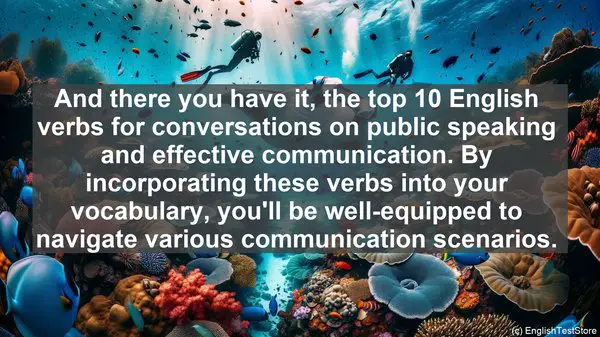Introduction
Welcome to today’s lesson. In the world of public speaking and effective communication, having a strong vocabulary is crucial. It allows us to articulate our thoughts and ideas with precision, ensuring that our message is conveyed effectively. Today, we’ll be diving into the top 10 English verbs that are particularly useful in conversations on these topics. So, let’s get started!
1. Express
The ability to express oneself clearly is at the core of effective communication. When we express our thoughts, we’re able to convey our message in a way that is easily understood by others. Whether it’s through words, gestures, or even facial expressions, the verb ‘express’ encompasses all these forms of communication.
2. Engage
Communication is a two-way street, and to truly connect with our audience, we need to engage them. This involves capturing their attention, encouraging their participation, and creating a dynamic environment. When we engage our listeners, we’re not just speaking at them, but rather, we’re fostering a dialogue.

3. Persuade
In many instances, our goal is not just to inform, but also to persuade. Whether it’s convincing someone of our viewpoint or inspiring them to take action, the verb ‘persuade’ is key. It involves presenting our arguments in a compelling manner, using evidence, logic, and even emotional appeals.
4. Adapt
Effective communication is not a one-size-fits-all approach. It requires us to adapt to different situations, audiences, and even cultural contexts. The ability to adapt means being flexible in our communication style, using appropriate language, and being sensitive to the needs and expectations of our listeners.
5. Summarize
In conversations, especially those that involve complex topics, the ability to summarize is invaluable. It allows us to condense information, highlighting the key points and ensuring that our message is clear and concise. When we summarize, we’re essentially distilling the essence of what has been said.
6. Facilitate
In group discussions or meetings, our role may not always be that of the speaker. Sometimes, we’re in the position of a facilitator, whose job is to ensure that the conversation flows smoothly. The verb ‘facilitate’ means to make something easier or more accessible, and in the context of communication, it involves guiding the discussion, encouraging participation, and managing any potential conflicts.
7. Clarify
Misunderstandings can easily arise in communication, and to avoid this, we need to clarify. When we clarify, we’re seeking to make something more understandable or to remove any doubts or confusion. This can be done through asking questions, providing examples, or even rephrasing what has been said.

8. Convey
At its core, communication is about conveying a message from one person to another. The verb ‘convey’ means to transport or transmit something, and in the context of communication, it involves ensuring that our message is delivered accurately and effectively. This can be done through various means, such as verbal communication, visual aids, or even body language.
9. Collaborate
In many professional settings, effective communication is closely tied to collaboration. The verb ‘collaborate’ means to work together with others towards a common goal. This involves not just sharing information, but also actively listening, considering different perspectives, and finding solutions as a team.
10. Conclude
Every communication has a conclusion, a point where we wrap up our thoughts or reach a decision. The verb ‘conclude’ means to bring something to an end or to reach a final decision or judgment. When we conclude a conversation, we’re essentially providing closure and ensuring that our message has been understood.
